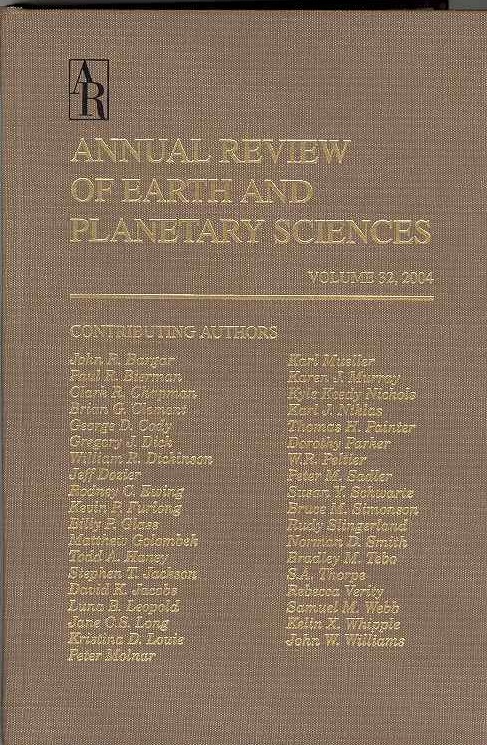碳都到哪里去了?
IF 13
1区 地球科学
Q1 ASTRONOMY & ASTROPHYSICS
Annual Review of Earth and Planetary Sciences
Pub Date : 2021-11-29
DOI:10.1146/annurev-earth-032320-092010
引用次数: 4
摘要
碳是宇宙中最丰富的物质之一;虽然在地球上已经严重枯竭,但它是生物化学的主要结构元素。碳和气候之间复杂的相互作用在地质时期稳定了地球系统。自20世纪50年代开始用现代仪器记录二氧化碳以来,大约一半的化石燃料排放已被封存在海洋和陆地生态系统中。海洋对化石二氧化碳的吸收受化学和循环的控制。土地净吸收量令人惊讶,因为它意味着世界范围内持续的增长大于衰退。土地碳汇包括(a) CO2施肥,(b)氮肥施肥,(c)农业放弃后的森林再生,以及(d)北方变暖。陆地和海洋中的碳汇都受到变暖的威胁,随着排放量的下降,由于先前储存的碳的释放,气候变化可能会扩大,碳汇可能会减弱甚至逆转。化石二氧化碳在停止排放后还会存在几个世纪甚至几千年。化石燃料燃烧产生的大约一半碳通过陆地和海洋的碳汇过程从大气中去除,减缓了二氧化碳的增加和全球变暖。随着气候变暖和排放量下降,这些碳汇可能会减弱甚至逆转。▪二氧化碳的陆地净汇要求植物生长的速度比它们腐烂的速度快几十年,导致生物圈中碳的积累超过了森林砍伐、火灾和其他干扰造成的碳损失。海洋吸收二氧化碳的速度很慢,因为只有地表水与空气发生化学接触。深海的冷水因其密度而在物理上与外界隔绝。大约一千年后,深水与水面混合。深水还不知道我们在这里!▪化石燃料排放停止后,大部分额外的二氧化碳将在大气中存留数百年甚至数千年。过量二氧化碳的寿命取决于历史总排放量;10%到40%可以持续到公元40000年。《地球与行星科学年度评论》第50卷的最终在线出版日期预计为2022年5月。修订后的估计数请参阅http://www.annualreviews.org/page/journal/pubdates。本文章由计算机程序翻译,如有差异,请以英文原文为准。
Where Has All the Carbon Gone?
Carbon is among the most abundant substances in the universe; although severely depleted in Earth, it is the primary structural element in biochemistry. Complex interactions between carbon and climate have stabilized the Earth system over geologic time. Since the modern instrumental CO2 record began in the 1950s, about half of fossil fuel emissions have been sequestered in the oceans and land ecosystems. Ocean uptake of fossil CO2 is governed by chemistry and circulation. Net land uptake is surprising because it implies a persistent worldwide excess of growth over decay. Land carbon sinks include ( a) CO2 fertilization, ( b) nitrogen fertilization, ( c) forest regrowth following agricultural abandonment, and ( d ) boreal warming. Carbon sinks in both land and oceans are threatened by warming and are likely to weaken or even reverse as emissions fall with the potential for amplification of climate change due to the release of previously stored carbon. Fossil CO2 will persist for centuries and perhaps many millennia after emissions cease. ▪ About half the carbon from fossil fuel combustion is removed from the atmosphere by sink processes in the land and oceans, slowing the increase of CO2 and global warming. These sinks may weaken or even reverse as climate warms and emissions fall. ▪ The net land sink for CO2 requires that plants have been growing faster than they decay for many decades, causing carbon to build up in the biosphere over and above the carbon lost to deforestation, fire, and other disturbances. ▪ CO2 uptake by the oceans is slow because only the surface water is in chemical contact with the air. Cold water at depth is physically isolated by its density. Deep water mixes with the surface in about 1,000 years. The deep water does not know we are here yet! ▪ After fossil fuel emissions cease, much of the extra CO2 will remain in the atmosphere for many centuries or even millennia. The lifetime of excess CO2 depends on total historical emissions; 10% to 40% could last until the year 40,000 AD. Expected final online publication date for the Annual Review of Earth and Planetary Sciences, Volume 50 is May 2022. Please see http://www.annualreviews.org/page/journal/pubdates for revised estimates.
求助全文
通过发布文献求助,成功后即可免费获取论文全文。
去求助
来源期刊

Annual Review of Earth and Planetary Sciences
地学天文-地球科学综合
CiteScore
25.10
自引率
0.00%
发文量
25
期刊介绍:
Since its establishment in 1973, the Annual Review of Earth and Planetary Sciences has been dedicated to providing comprehensive coverage of advancements in the field. This esteemed publication examines various aspects of earth and planetary sciences, encompassing climate, environment, geological hazards, planet formation, and the evolution of life. To ensure wider accessibility, the latest volume of the journal has transitioned from a gated model to open access through the Subscribe to Open program by Annual Reviews. Consequently, all articles published in this volume are now available under the Creative Commons Attribution (CC BY) license.
 求助内容:
求助内容: 应助结果提醒方式:
应助结果提醒方式:


